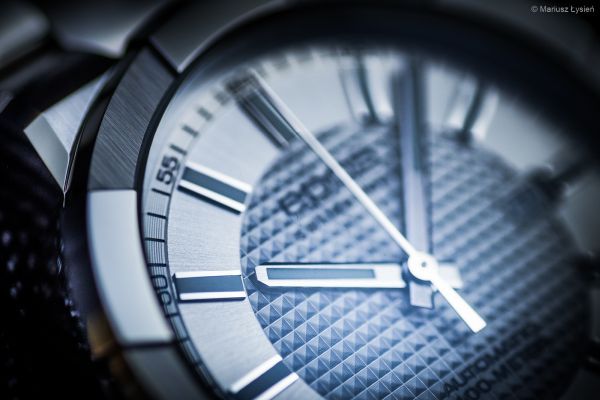What Causes a Watch to Run Slow or Fast?
Every watch has a tolerance for error, whether it is a quartz or mechanical watch. Additionally, there are different accuracy requirements for various types of watches. However, while a delay of a few seconds is usually not a problem, continuous miscalibration can be irritating. What causes a watch to run slow or fast, and how can you fix it?
Why is the clock running slow? A natural behavior of the mechanism or a sign of wear?
Have you ever looked at your wrist and noticed that your watch is running slow and not showing the correct time? This is quite a common problem, and there can be several causes. Sometimes it's just a matter of the natural tolerance of the mechanism, and other times it’s a sign of wear or the conditions in which we wear the watch. It’s important to remember that everything depends on the type of watch, because a mechanical model works differently from a quartz or electronic watch.
Mechanical watch running slow? Temperature fluctuations are the biggest enemy of the mechanism
The main culprit of miscalibration in mechanical watches is temperature fluctuations. Such a watch should be protected from frost and direct sunlight. The reason why extreme temperatures affect the time reading is due to the metal components from which the watch is made. It’s important to remember that on warm days, these components may expand, whereas in winter they contract. If you don’t want your automatic watch to run slow, you must wind the mechanism while following the instructions provided with the watch.
Automatic watches
Watches with automatic winding require continuous movement, as their mechanism is powered by the natural movements of the wrist. Automatic watches run slow most often when they are worn too infrequently or not stored properly. Although these timepieces don’t need to be wound frequently, prolonged inactivity can lead to miscalibration of the mechanism. Additionally, a slowdown in movement can be the result of a shock or wear of the lubricant, which affects the smoothness of the spring’s operation. If the watch starts running slower, it’s a good idea to have it checked to avoid more serious issues.
Quartz watches
For quartz watches, the key factor affecting their precision is the frequency of the quartz resonator’s oscillations, which in theory should be constant. However, even this mechanism is not free from errors – temperature changes can affect the stability of the oscillations, which in turn can cause delays. If your quartz watch is running slow, it’s worth checking if it has been exposed to extreme conditions, such as severe frost or high humidity. Sometimes the issue may also be due to a depleted battery, so replacing the battery often solves the problem of inaccurate time display.
Classic men's automatic watch - Orient Classic Bambino
Is your watch running fast? See what causes the timepiece to beat its own, accelerated rhythm
Have you noticed that the watch shows the time a little faster than it should? This is quite a common situation, especially with mechanical and automatic watches. There can be several reasons for this – some result from the natural wear of the mechanism, while others are caused by external factors that we often overlook. Let’s take a look at the most common causes for why a watch starts measuring time too quickly.
Grease thickening
Grease in a watch is essential for its proper functioning – it ensures the smooth movement of gears and minimizes friction between the mechanism's parts. Over time, however, it can thicken, especially if the watch hasn’t been serviced in years. Too thick grease causes some parts to start working unnaturally, which can lead to the watch running faster. The best solution in this case is a service from a watchmaker, who will clean the mechanism and apply a new layer of grease with appropriate properties.
Rapid temperature changes
Metal components of the watch mechanism expand and contract with temperature changes, which can directly affect its precision. If the watch often transitions from cold to warm (for example, in winter when you enter a heated room), slight deformations can occur that affect the balance spring’s working speed. As a result, the watch begins to measure time faster than it should. The best way to avoid this problem is to store the watch in moderate conditions and avoid sudden temperature fluctuations.
The tension of the spring
In mechanical watches, the key element responsible for timekeeping is the mainspring. If it is too tightly wound, the watch may run faster because the mechanism receives more energy than it should. This works the other way around as well – if the automatic watch is running slow, it may be a sign that the spring is too loosely wound. Regular winding of the watch and following the manufacturer's instructions can help prevent this problem.
Reaction to changes in Earth’s gravitational field
Although this sounds like a quantum physics issue, it is quite significant in horology. The position in which we wear the watch affects how its mechanism works. If the watch remains in one position most of the time (for example, on the wrist of a person who moves their arm in a specific way), some parts may wear unevenly. As a result, the balance mechanism starts to run faster or slower, causing the time indications to speed up or slow down. The most advanced watches use a tourbillon mechanism, which compensates for the effects of gravity, but in standard models, regular maintenance and periodic regulation of the timekeeping are sufficient.
Unique couple watches by Cover
How to fix the clock? Check if your model can be regulated!
What should you do when your watch is running fast or slow? Again, it all depends on what type of timepiece we are talking about.
Digital clock – winding the watch is not an option, so what should you do?
If the time shown by a digital clock is inaccurate, it is very likely that unfortunately, it won’t be possible to fix it. This happens because the electronic mechanism is based on a clock generator. This element is a microcircuit emitting an impulse at a specific time interval.
There are two main reasons for time reading issues. One of them is a change in internal parameters, specifically a reduction in the capacitor's capacity. Unfortunately, it’s impossible to create a microcircuit that would be highly accurate. In every case, such a clock will gradually perform worse, even if the encountered error is minimal.
How to regulate a wall clock?
If your clock is powered by a battery, and it is running fast, you need to replace the battery. However, if it’s a self-winding clock, regulating the movement in this case will be much more complicated. For such a clock, you can try repairing it yourself. As soon as you notice a deviation in the clock's springs, turn the minute hand in the direction of its movement, and the clock will start functioning correctly again. However, if you are concerned about damaging it, it’s best to contact a watchmaker.
What to do if the quartz watch is running fast?
Quartz clocks are more accurate than mechanical watches, but they still encounter precision issues. In the case of such a watch, it’s best to take it to a professional. However, it’s worth noting that sometimes the repair may cost as much as the watch itself, so sometimes purchasing a new model is a better option.
Looking for more advice? Visit our blog, where you can read, among other things, about how to measure watch case dimensions.
Summary
Before purchasing a watch, remember to consult with the specialists from our online watch store. We will help you choose and provide detailed advice on what to pay attention to when buying a watch. This can be especially helpful when selecting an expensive model.
If you don’t know which timepiece to choose, take a look at our Swiss watch ranking. We invite you!
See popular articles

Dlaczego zmieniamy czas na zimowy w zegarkach? Tłumaczymy mechanizm i historię zmiany czasu
Dwa razy w roku cofamy lub przesuwamy wskazówki zegara, ale rzadko zastanawiasz się, po co właściwie jest zmiana czasu i dlaczego wciąż jej przestrzegamy. To nie tylko kwestia tradycji – za tym zwyczajem stoi historia, decyzje polityczne i próba lepszego wykorzystania światła dziennego. Sprawdź, jak działa mechanizm przestawienia czasu, skąd się wziął i jakie ma znaczenie dziś.

Zegarki solarne - ranking ciekawych modeli i wszystko co warto wiedzieć przed zakupem
Zegarki solarne to nowoczesne połączenie stylu i praktyczności – zasilane światłem, niezawodne i przyjazne środowisku. Dzięki wbudowanym panelom solarnym nie wymagają regularnej wymiany baterii, co czyni je wyjątkowo wygodnymi w codziennym użytkowaniu i bardziej ekologicznymi. W naszym rankingu znajdziesz modele, które wyróżniają się nie tylko atrakcyjnym designem, ale również bogatą funkcjonalnością i imponującą trwałością, idealne dla wymagających użytkowników poszukujących zegarka na lata.

Jak zmienić czas na zimowy w Casio G Shock?
Zmiana czasu potrafi zamieszać – nie tylko w głowie, ale i na nadgarstku. Jeśli nosisz G-Shocka i chcesz szybko przestawić go na czas zimowy, nie musisz zagłębiać się w instrukcje ani zgadywać, który przycisk za co odpowiada. W tym poradniku znajdziesz konkretne wskazówki, proste kroki i sprawdzone triki, które pomogą Ci bez nerwów ustawić zegarek Casio G-Shock – niezależnie od modelu, który masz.

Jak dobrać biżuterię do zegarka? Zasady, inspiracje i gotowe triki stylizacyjne
Dobranie biżuterii do zegarka to nie tylko kwestia gustu, ale przede wszystkim umiejętność stworzenia spójnej, stylowej całości. Zegarek może być subtelnym tłem dla dodatków albo główną ozdobą, wokół której budujesz cały look. Sprawdź, jak łączyć metale, wybierać bransoletki i tworzyć zestawienia, które zawsze wyglądają elegancko i nowocześnie.

Jaki zegarek na 40 urodziny wybrać? TOP 5 wyborów
Czterdzieste urodziny to wyjątkowy moment – symboliczny etap życia, w którym zegarek może stać się nie tylko praktycznym dodatkiem, ale także wyrazem stylu, statusu i osobowości. Zegarek na 40 urodziny powinien podkreślać dojrzały gust, elegancję oraz indywidualność obdarowanego – kluczowe znaczenie ma jakość, prestiż marki oraz funkcjonalność dopasowana do codziennych aktywności Poniżej przedstawiamy TOP 5 zegarków męskich na 40 urodziny dostępnych w ofercie sklepu WestWatches – zapraszamy!

Jaki zegarek kupić na dzień chłopaka? TOP 6 propozycji od West Watches
Dzień Chłopaka to świetna okazja, aby podarować coś wyjątkowego – prezent, który będzie nie tylko praktyczny, ale i symboliczny. Zegarek to zawsze trafiony wybór – elegancki, funkcjonalny i trwały. Ważne jednak, by dopasować go do stylu oraz trybu życia obdarowywanego. Czy woli klasyczną elegancję, sportowy look, a może nowoczesne technologie? Poniżej znajdziesz sześć propozycji z oferty WestWatches.pl, które sprawdzą się jako idealny prezent.

Czym jest bezel zegarka? Wyjaśniamy jego zastosowanie i zalety
Bezel to detal, który często umyka uwadze, a w rzeczywistości decyduje o funkcjonalności, stylu i bezpieczeństwie zegarka. To właśnie ten pierścień sprawia, że czasomierz staje się czymś więcej niż tylko ozdobą na nadgarstku. Dowiedz się, co to jest bezel w zegarku, jak działa i do czego możesz go wykorzystać na co dzień.

Tachometr - co to jest i jaką funkcję pełni w zegarku?
Tachometr w zegarku to coś więcej niż ozdobna skala na tarczy – to praktyczne narzędzie, które pozwala w kilka sekund obliczyć średnią prędkość na wybranym dystansie. Choć dziś korzystasz z GPS-u, ta klasyczna funkcja nadal ma swój urok i znaczenie, łącząc precyzję z historią zegarmistrzostwa.

Bransoleta mesh - czym jest i do jakich stylizacji pasuje?
Jeśli szukasz dodatku, który połączy wygodę codziennego noszenia z elegancją biżuterii, bransoleta mesh może być strzałem w dziesiątkę. Ten charakterystyczny, mediolański splot od lat zdobywa uznanie zarówno wśród miłośników klasycznych zegarków, jak i fanów nowoczesnych smartwatchy. Zanim zdecydujesz się na zakup, sprawdź, co dokładnie oznacza ten typ bransolety, jakie są opinie użytkowników i w jakich stylizacjach sprawdza się najlepiej.












